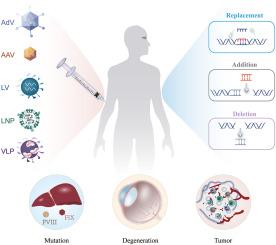In vivo gene therapy: A strategy for mutations, degenerations, and tumors
IF 9.4
2区 医学
Q1 BIOCHEMISTRY & MOLECULAR BIOLOGY
引用次数: 0
Abstract
Gene mutations, organ function degeneration, and carcinogenesis are the primary threats to human health. Gene therapy, which involves the addition, deletion, regulation, and editing of genes, as well as the development of genetic vaccines, can potentially cure genetic mutation disorders, degenerative diseases, and cancers. Ex vivo gene therapy has recently been used to treat monogenetic mutation diseases of the hematopoietic system and cancers. However, in vivo gene therapy remains inapplicable. The primary elements of in vivo gene therapy include deoxyribonucleic acid (DNA) nucleases (e.g., zinc finger nucleases, transcription activator-like effector nucleases), CRISPR-Cas system, base editors, prime editors, and delivery vectors (e.g., viral and non-viral vehicles). According to the development of DNA nucleases and delivery vectors, in vivo gene therapy can be made available for future clinical use. The current review summarizes the development of DNA nucleases and delivery vectors for in vivo gene therapy, emphasizing recent progress.

体内基因治疗:一种治疗突变、变性和肿瘤的策略
基因突变、器官功能退化和致癌是人类健康的主要威胁。基因治疗包括基因的添加、删除、调节和编辑,以及基因疫苗的开发,有可能治愈基因突变疾病、退行性疾病和癌症。体外基因治疗最近被用于治疗造血系统的单基因突变疾病和癌症。然而,体内基因治疗仍然不适用。体内基因治疗的主要元素包括脱氧核糖核酸(DNA)核酸酶(如锌指核酸酶、转录激活物样效应核酸酶)、CRISPR-Cas系统、碱基编辑器、引物编辑器和传递载体(如病毒和非病毒载体)。随着DNA核酸酶和传递载体的发展,体内基因治疗可用于未来的临床应用。本文综述了用于体内基因治疗的DNA核酸酶和传递载体的研究进展,重点介绍了近年来的研究进展。
本文章由计算机程序翻译,如有差异,请以英文原文为准。
求助全文
约1分钟内获得全文
求助全文
来源期刊

Genes & Diseases
Multiple-
CiteScore
7.30
自引率
0.00%
发文量
347
审稿时长
49 days
期刊介绍:
Genes & Diseases is an international journal for molecular and translational medicine. The journal primarily focuses on publishing investigations on the molecular bases and experimental therapeutics of human diseases. Publication formats include full length research article, review article, short communication, correspondence, perspectives, commentary, views on news, and research watch.
Aims and Scopes
Genes & Diseases publishes rigorously peer-reviewed and high quality original articles and authoritative reviews that focus on the molecular bases of human diseases. Emphasis will be placed on hypothesis-driven, mechanistic studies relevant to pathogenesis and/or experimental therapeutics of human diseases. The journal has worldwide authorship, and a broad scope in basic and translational biomedical research of molecular biology, molecular genetics, and cell biology, including but not limited to cell proliferation and apoptosis, signal transduction, stem cell biology, developmental biology, gene regulation and epigenetics, cancer biology, immunity and infection, neuroscience, disease-specific animal models, gene and cell-based therapies, and regenerative medicine.
 求助内容:
求助内容: 应助结果提醒方式:
应助结果提醒方式:


